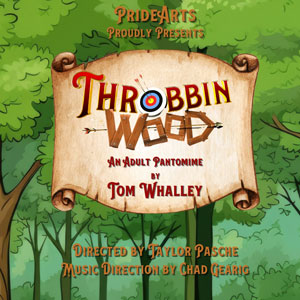
 **** Bawdy, audacious, and often ridiculous, “Throbbin Wood” by Tom Whalley is an outrageous treat! This bizarre comedy, directed by Taylor Pasche, is a spoof on the medieval ballads of Robin Hood and his merry men… who are a lot merrier (read “hornier”) than you think! The play fits the British definition of an adult pantomime, which is a theatrical entertainment that involves music, topical jokes, and slapstick comedy, based on a fairytale. Today’s combination of burlesque and physical comedy is an immersive experience in the “ye olde fashioned” sense: where the audience is encouraged to hoot, holler, and swear at some actors while other actors set up the insults and coach us on the plot twists. So if you’re good with low-brow humor, heavy uses of the f-word, sexual suggestion, and audience interaction with the characters, then this show is for you!
**** Bawdy, audacious, and often ridiculous, “Throbbin Wood” by Tom Whalley is an outrageous treat! This bizarre comedy, directed by Taylor Pasche, is a spoof on the medieval ballads of Robin Hood and his merry men… who are a lot merrier (read “hornier”) than you think! The play fits the British definition of an adult pantomime, which is a theatrical entertainment that involves music, topical jokes, and slapstick comedy, based on a fairytale. Today’s combination of burlesque and physical comedy is an immersive experience in the “ye olde fashioned” sense: where the audience is encouraged to hoot, holler, and swear at some actors while other actors set up the insults and coach us on the plot twists. So if you’re good with low-brow humor, heavy uses of the f-word, sexual suggestion, and audience interaction with the characters, then this show is for you!
The notoriously evil Sheriff of Frottingham (Ryder McDaniel) is exploiting the good people of Got-Wood Forest. But who can save them from high taxes and outright cruelty? No less than the legendary outlaw hero Throbbin Wood (Bryan Fowler) and his horny men, who take from the rich to give to the poor! Their first victims are Silly Willy (Freddy Mauricio) and his mother Nanny Fanny (Neill Kelly), but it turns out that neither has any money! Kelly is funny as hell in a cross-dressing role and plays up his/her/their assets to the hilt, not to be confused with the hilt of the sword, which the Throbbin and the Sheriff have both mastered. While the Sheriff wants to steal the affections of Maid Marion (Emma Robie) and “do her dirty”, it is up to Throbbin to save her—and to save England from the Sheriff’s power grab. The story would not be complete without Triar F**k (Jack Gordon) and Little Jonnie (Jackson Anderson), plus Fairy Glitterous (Danielle Bahn) and Anal-A-Dale (Kyle Johnson).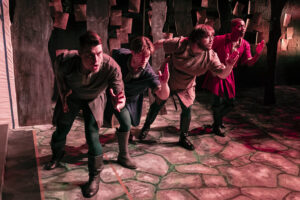
McDaniel is truly amazing playing the part of the Sheriff! He commands the stage and could not have portrayed the villain any better. The audience loved to boo him every time he made an appearance. The singing by Fowler and Robie is especially good, and I particularly enjoyed the numbers with the bouncy choreography, the work of Jen Cupani. Hayley Wallenfeldt’s scenic design is simple and multipurpose: largely a forest backdrop with two turrets and a stone floor, plus an arbor. The music is contemporary (as compared to Renaissance), and the popular songs fit the bill well (or with tweaks) or there is some kind of new arrangement, thanks to the fine work of music director Chad Gearig. Considering that this show is based on a series of ballads, we listen to quite a bit of rhyme, especially towards the beginning. The mashup of modern British English, a bit of Middle English, and American English is nicely accomplished so as to be understood by a contemporary audience. Costume design by Victoria Jablonski is hilarious. I especially enjoyed the mashup of garments. They range from Nanny Fanny’s long peasant gown, Maid Marion’s Renaissance dress, and, of course, the pink fairy costume—all the way to the men’s 15th and 16th century outfits, complete with a variety of codpieces and tights. Plus some men would prance around in modern dress wearing, for example, Cubs, U of I, and Bulls sweatshirts. Jack Goodman’s lighting design works for this show as well as Val Gardner’s sound design. Props could range from bows and arrows to swords—to modern tents, organized by props designer Annaleigh Stone. Lana Whittington, the fight and Intimacy choreographer, does a great job, considering how many scenes contain violence and close contact among the actors.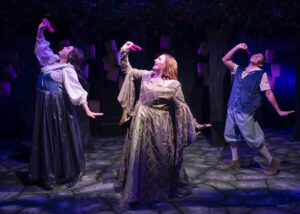
What I liked best about this production is that it is true to its historical underpinnings as well as to the sexualized nature of medieval entertainment geared to the peasants of the Middle Ages and Renaissance. While the exact origins of the Robin Hood tale are unclear, most evidence seems to indicate that he was a real person and not a myth. There is some proof that Robin of Loxley was born in 1160 and that he accompanied King Richard I (Richard the Lionhearted) during the Crusades (otherwise known as King Dick in this show). Other chroniclers, however, believe that Robin Hood was from Wakefield and took part in Thomas of Lancaster’s rebellion in 1322. Either way, the stories about this folk hero were eventually compiled in a book called “The Ballad of Robin Hood”, written by Martin Parker and published in 1632. Parker was a prominent 17th century “broadside balladist”, meaning that his stories took the form of print on a large piece of paper printed on one side only. So when the audience walks into the small black box theatre, the first thing we notice is a huge number of (broadside) posters on the walls that state: “WANTED: Throbbin Wood.” This does homage to Parker’s version of the tale, which preserves the coarse language of the Middle Ages, as compared to the compilation by American writer Howard Pyle, published in 1883, where the ballads formed chapters and the language was made suitable for children.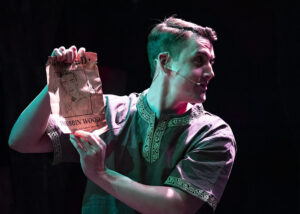
This is not everybody’s type of show. Some comic bits are old and corny, some goofy and crazy. That said, the interweaving of music, dance, poems and stories from the ballads is skillfully done. I especially liked the moments where characters got their jollies in all sorts of ways. Yet there were moments when I wondered whether some members of the audience were complicit with the actors and knew exactly when and how to guide our boos, cheers, and hisses. But I must confess that when the silliness descends into ridiculousness, the show isn’t as amusing as I might have liked. Although I enjoyed the addition of all manner of sexual content and silly puns to the story of this popular hero, some bits are simply funnier and more entertaining than others. It’s not the amount of prurience (word of the day) that makes this performance any more or less amusing but, rather, by the second act, we get the point already. That being said, I found it to be a fun rump (I mean romp) where you don’t need to know the original tale to grasp what’s happening—and to whom. Tom Whalley’s witty script will have you in stitches, that is, if you enjoy lewd humor, puns, touchés, and tushery (second word of the day). While there’s not as much adventure as there might be in the traditional story of Robin Hood, this charming and preposterous show will take you away from your troubles. If something doesn’t tickle your funny bone or your fancy, simply wait a moment or two. Just be certain to put your inhibitions aside—and maybe have a drink or two. Huzzah!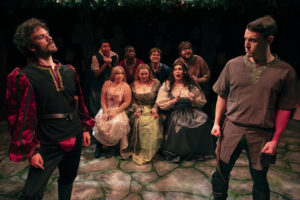
“Throbbin Wood” is playing through December 15, 2024, at Pride Arts Center, 4139 N. Broadway, Chicago.
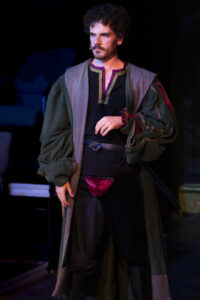 Curtain times Wednesdays–Saturdays at 7:30 pm, Sundays at 3 pm
Curtain times Wednesdays–Saturdays at 7:30 pm, Sundays at 3 pm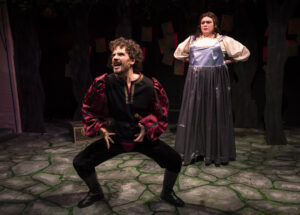
No shows November 25 – 29.
Tickets $35 for regular performances, $25 for previews. Seniors and students receive a $5 discount off all performance prices.
For more information about this show see: https://www.pridearts.org/new-page-1 or call 773-857-0222.
To purchase tickets, visit: https://www.pridearts.org/twtickets or call 773-857-0222.
For general information about Pride Arts and to see a list of their other offerings, go to: https://www.pridearts.org/.
To see what others are saying, visit www.theatreinchicago.com, go to Review Round-Up and click at “Throbbin Wood”.






More Stories
“The Firebugs” reviewed by Julia W. Rath
“The Book of Grace” Al Bresloff with another from Paul LIsnek
“The Last Five Years” MILWAUKEE